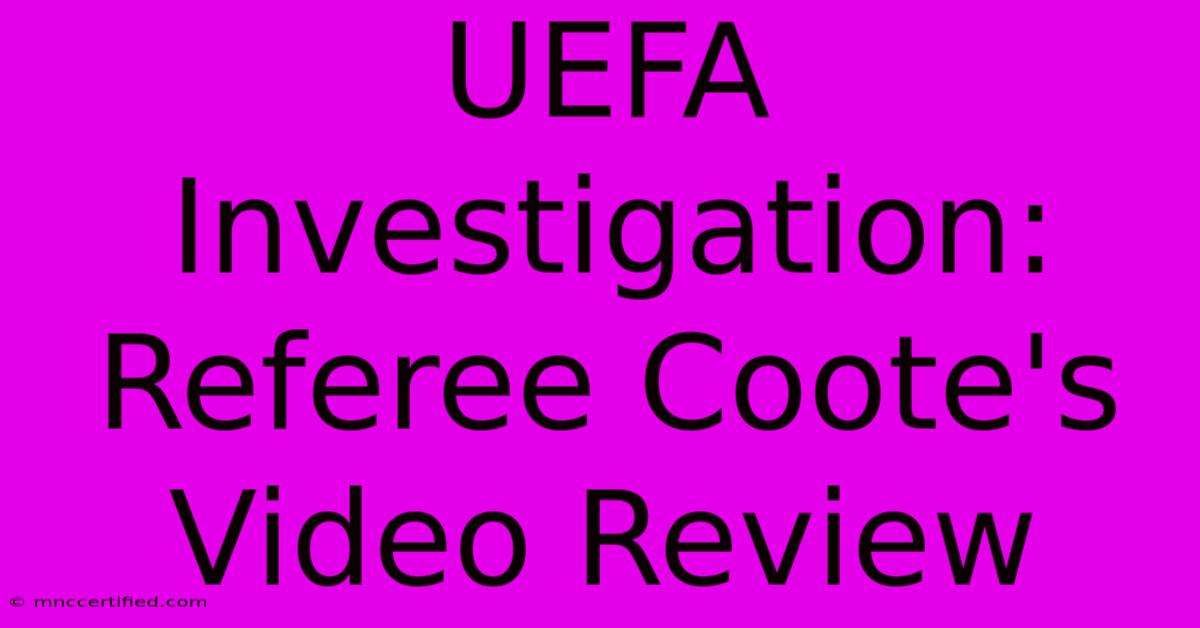UEFA Investigation: Referee Coote's Video Review

Table of Contents
UEFA Investigation: Referee Coote's Video Review Under Scrutiny
The recent UEFA Champions League match between [Team 1] and [Team 2] has sparked controversy following a controversial penalty decision, raising questions about the efficacy of Video Assistant Referee (VAR) technology and the performance of referee [Referee Name].
The Incident and its Aftermath
The incident in question occurred in the [minute]th minute of the match when [briefly describe the incident]. Referee [Referee Name] initially [state initial decision], but after reviewing the incident on VAR, [state final decision]. This decision immediately drew protests from [Team 2] players and fans, who argued that the penalty was not justified.
Following the match, UEFA announced an official investigation into the referee's use of VAR, specifically focusing on [state the areas of focus of the investigation, e.g., the clarity of the evidence reviewed, the communication between the VAR and the on-field referee, the final decision made].
The Role of VAR and Its Limitations
The introduction of VAR in football was meant to reduce controversial refereeing decisions and improve the overall fairness of the game. However, the recent incident highlights some inherent limitations of the technology.
- Subjectivity of Judgment: Even with access to multiple camera angles and replays, interpreting the footage can still be subjective. The UEFA investigation will likely delve into whether [Referee Name]'s interpretation of the evidence aligned with the established VAR guidelines.
- Communication and Collaboration: Effective communication between the VAR and the on-field referee is crucial. The investigation may examine whether there was adequate dialogue between the two officials and whether the final decision was the result of a collaborative process.
- Impact on the Flow of the Game: Critics argue that VAR interventions often disrupt the natural rhythm of the game and can lead to excessive delays. This incident further adds fuel to this debate.
Impact on Public Perception
The controversy surrounding the penalty decision has ignited a debate about VAR's effectiveness and raised questions about the consistency and transparency of its implementation. This has led to a wave of criticism directed towards [Referee Name] and the overall VAR system.
Looking Ahead: Learning from the Controversy
The UEFA investigation is expected to shed light on the intricacies of the incident and the use of VAR. It is crucial that UEFA uses this opportunity to learn from the controversy, review its existing VAR protocols, and address the concerns raised by the football community.
- Clearer Guidelines: Providing more specific and unambiguous VAR guidelines can help reduce subjectivity in decision-making.
- Improved Training and Communication: Enhancing training for VAR officials and on-field referees, emphasizing clear communication and collaborative decision-making, is essential.
- Transparency and Accountability: UEFA should consider increasing transparency by publishing more details about VAR decisions and providing explanations for controversial calls.
The UEFA investigation into referee [Referee Name]'s VAR review will undoubtedly have implications for the future of the technology. It is an opportunity for football governing bodies to re-evaluate VAR, address its limitations, and work towards ensuring its effective and fair implementation in the future.

Thank you for visiting our website wich cover about UEFA Investigation: Referee Coote's Video Review. We hope the information provided has been useful to you. Feel free to contact us if you have any questions or need further assistance. See you next time and dont miss to bookmark.
Featured Posts
-
Uefa Nations League Greece Vs England Live Stream
Nov 15, 2024
-
Confirmed 00s Rappers Irish Gig Details
Nov 15, 2024
-
Composite Bonding Prior To Wedding
Nov 15, 2024
-
Aquablation Cost Without Insurance
Nov 15, 2024
-
Local Grandma Raises Money With Pudsey Jumpers
Nov 15, 2024